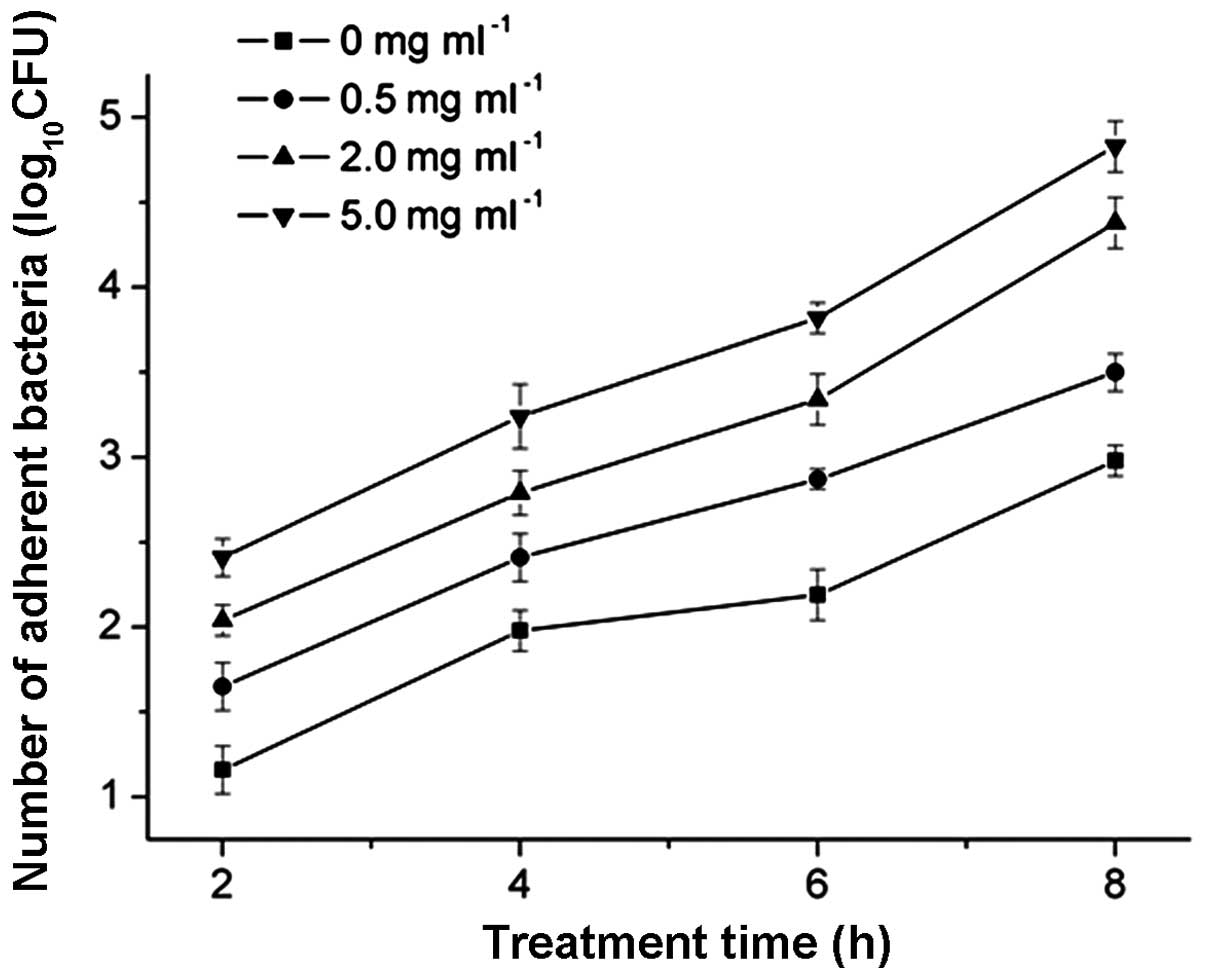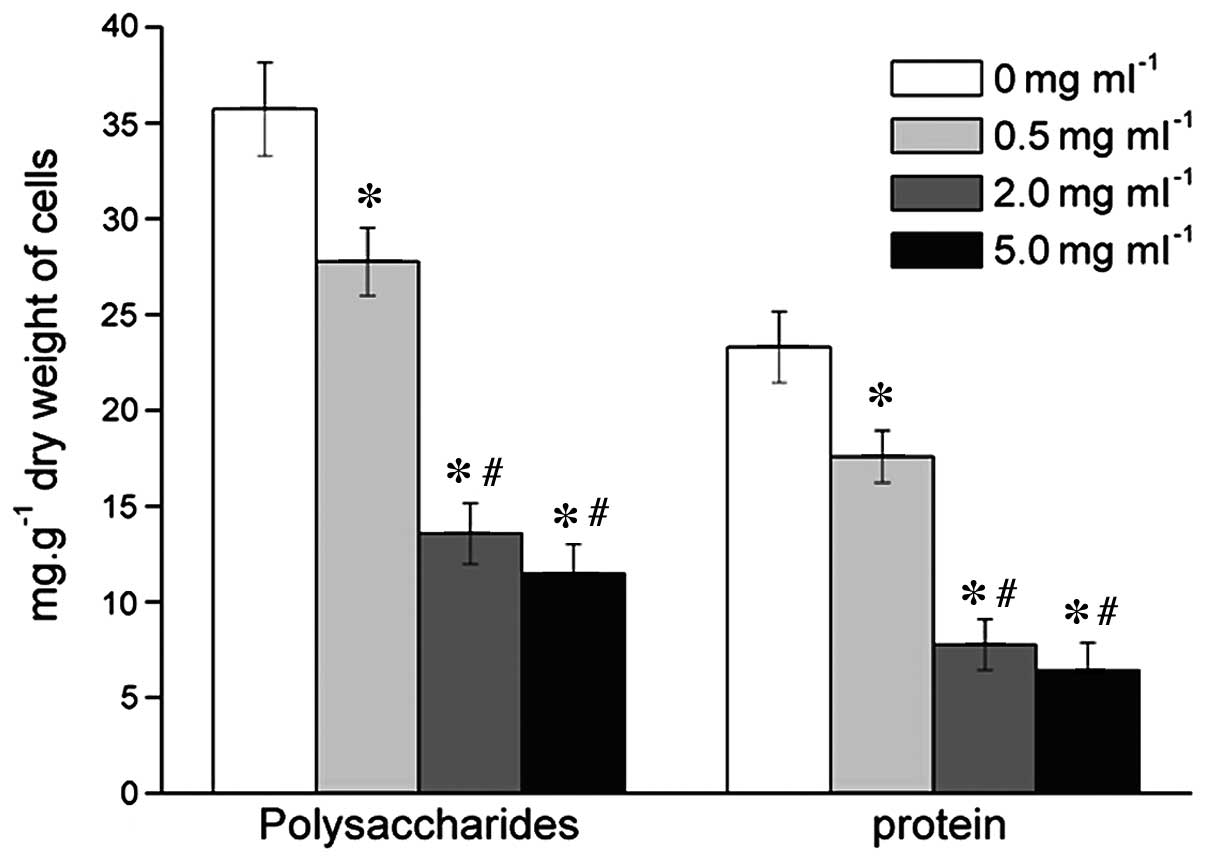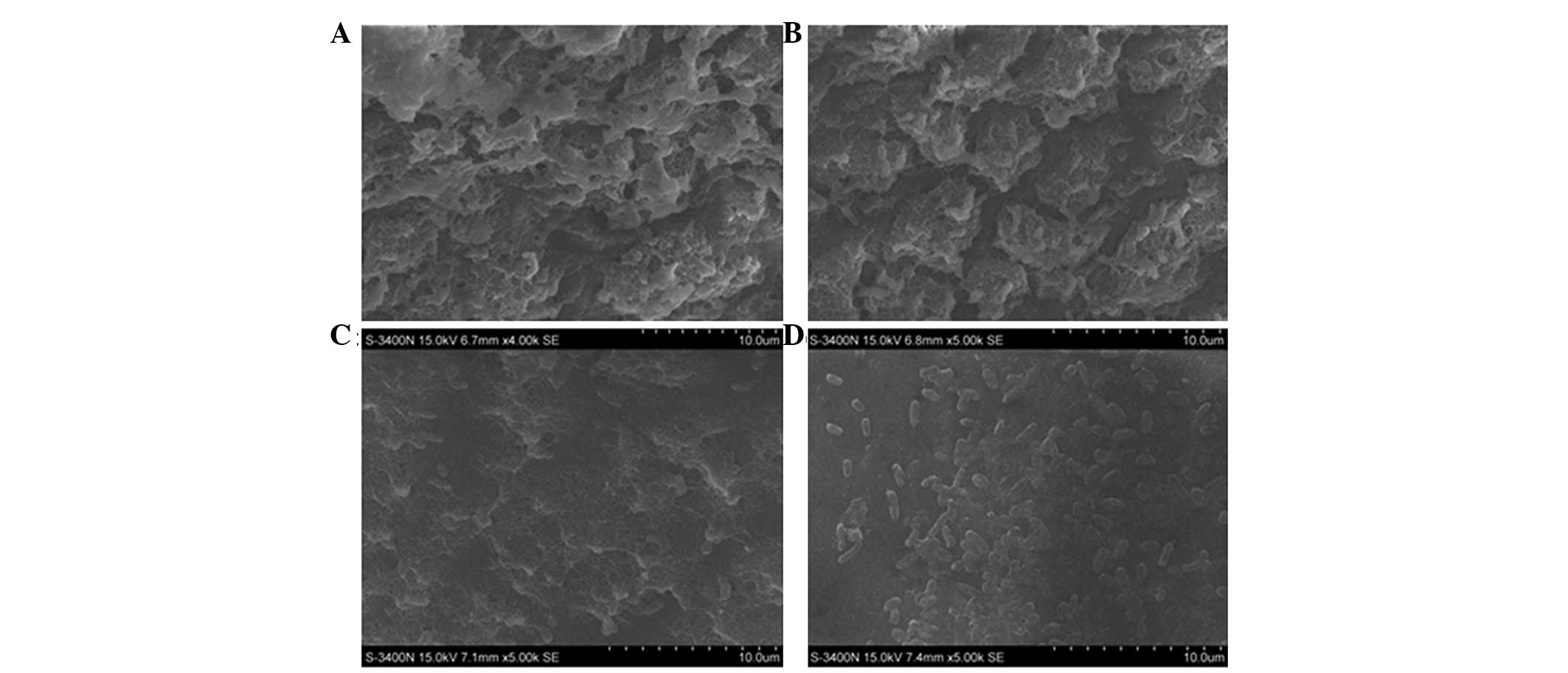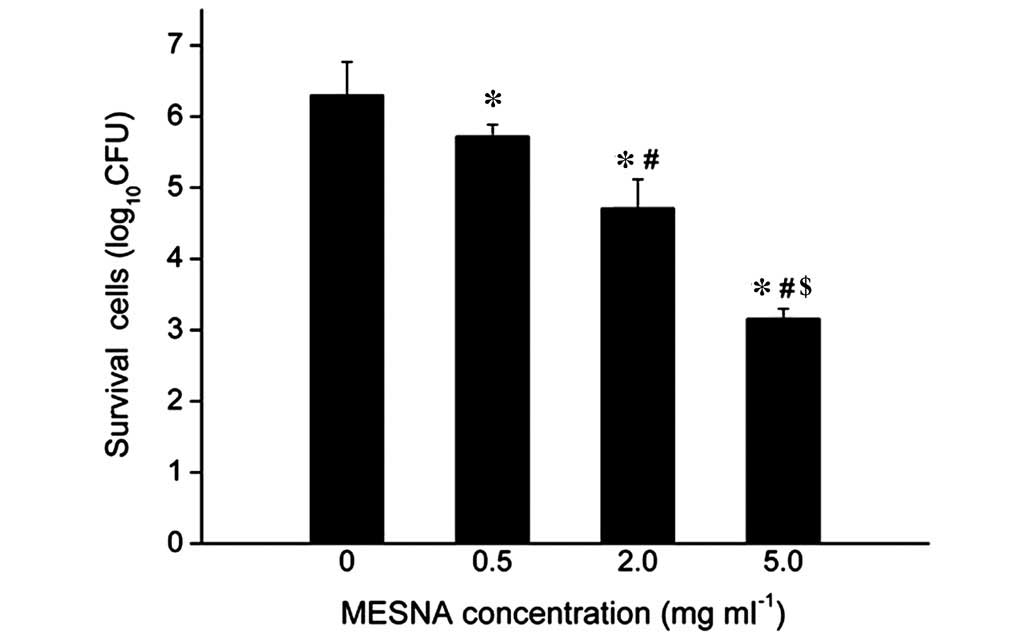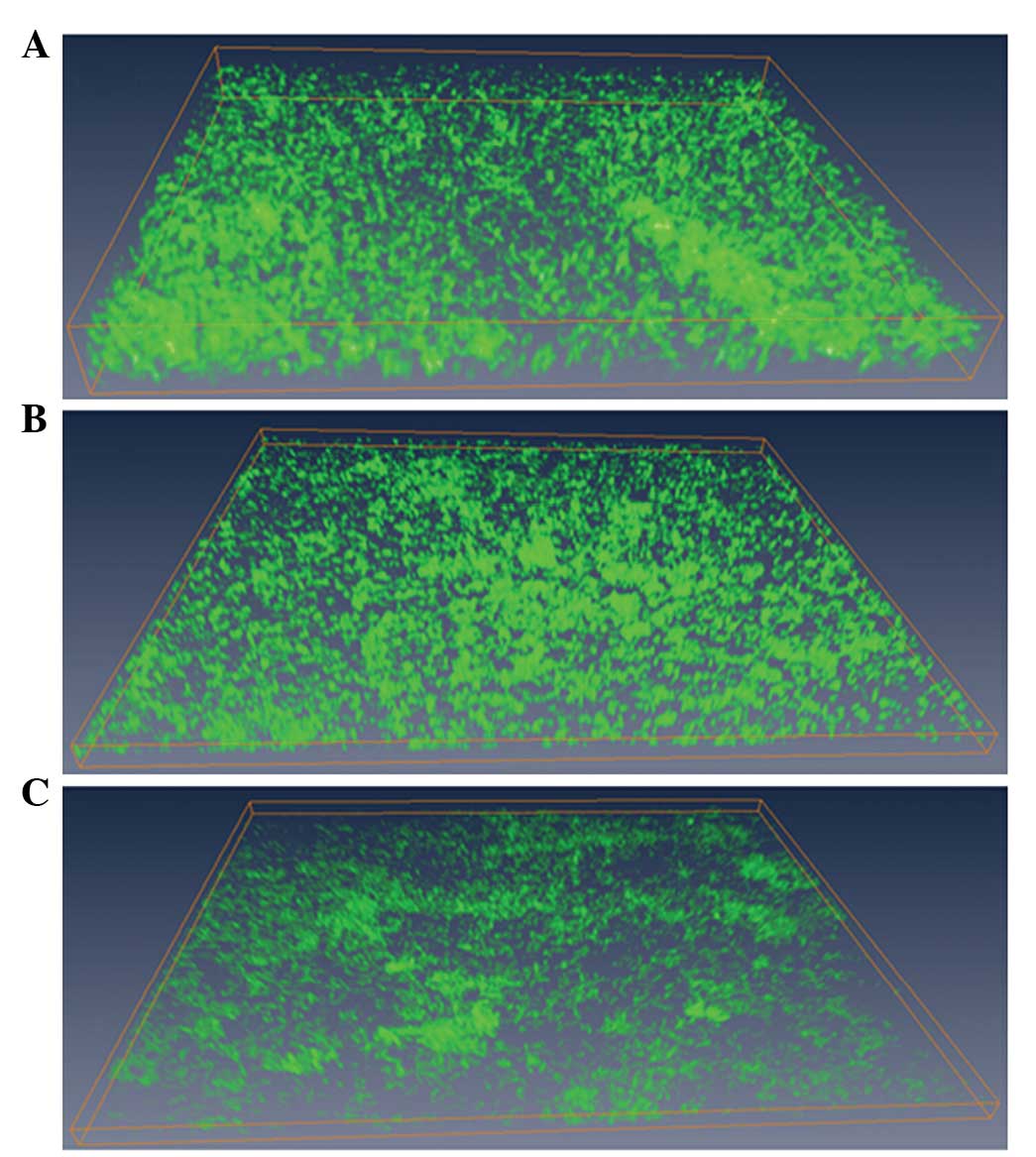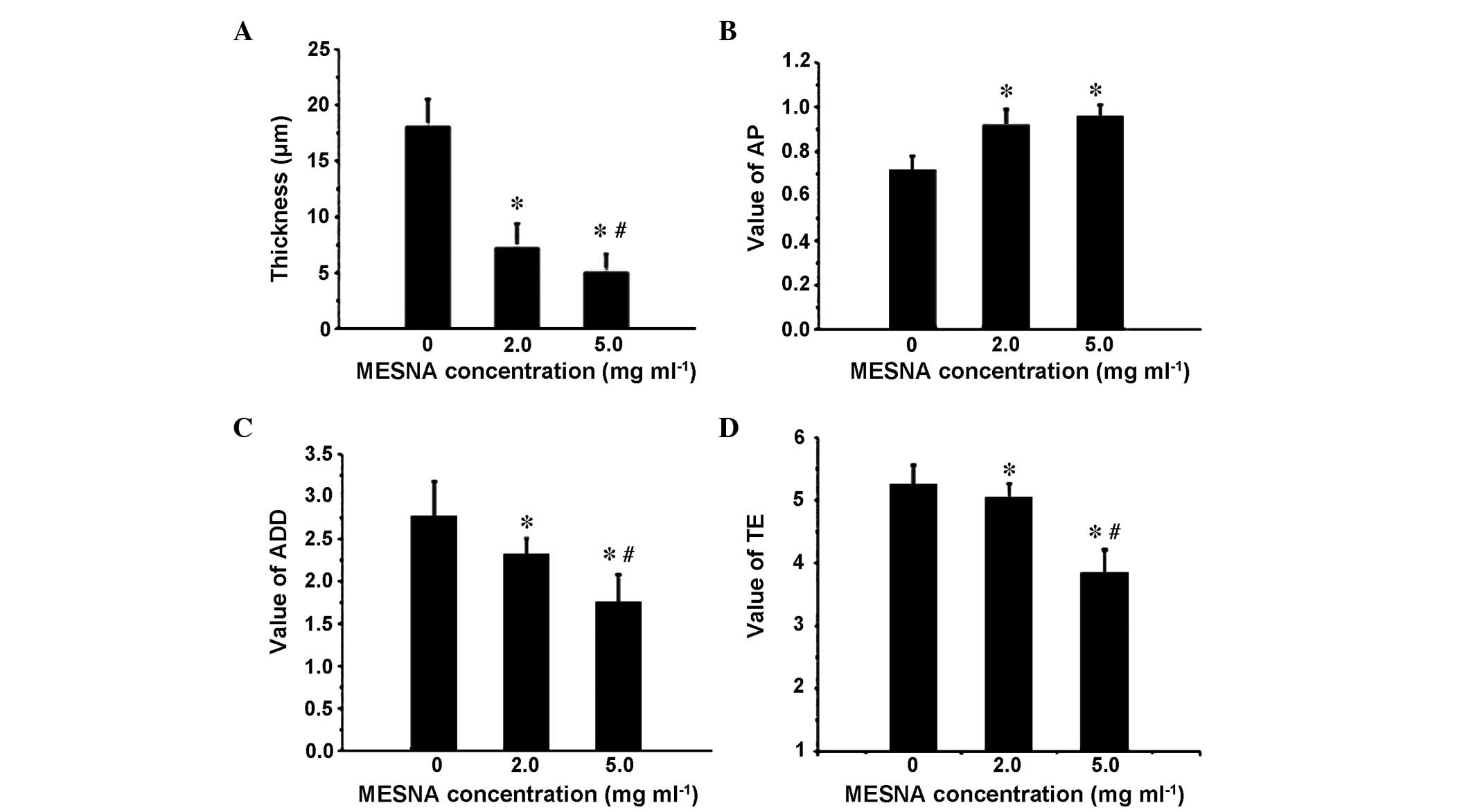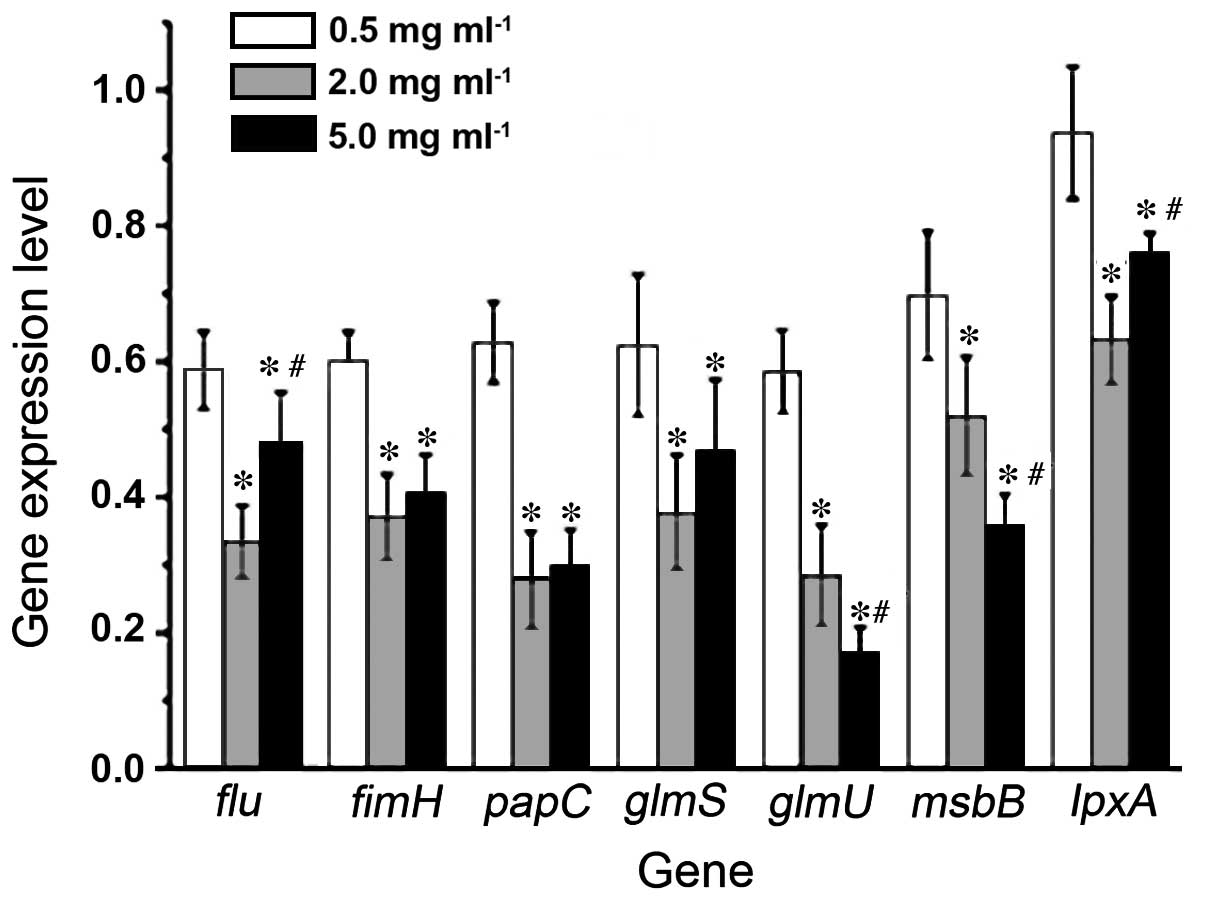|
1
|
Arciola CR: New concepts and new weapons
in implant infections. Int J Artif Organs. 32:533–536.
2009.PubMed/NCBI
|
|
2
|
Vasilev K, Cook J and Griesser HJ:
Antibacterial surfaces for biomedical devices. Expert Rev Med
Devices. 6:553–567. 2009. View Article : Google Scholar : PubMed/NCBI
|
|
3
|
Høiby N, Bjarnsholt T, Givskov M, Molin S
and Ciofu O: Antibiotic resistance of bacterial biofilms. Int J
Antimicrob Agents. 35:322–332. 2010. View Article : Google Scholar : PubMed/NCBI
|
|
4
|
Lopes SP, Ceri H, Azevedo NF and Pereira
MO: Antibiotic resistance of mixed biofilms in cystic fibrosis:
Impact of emerging microorganisms on treatment of infection. Int J
Antimicrob Agents. 40:260–263. 2012. View Article : Google Scholar : PubMed/NCBI
|
|
5
|
Tao XB, Qian LH, Li Y, Wu Q, Ruan JJ, Cai
DZ and Peng H: Hospital-acquired infection rate in a tertiary care
teaching hospital in China: A cross-sectional survey involving 2434
inpatients. Int J Infect Dis. 27:7–9. 2014. View Article : Google Scholar : PubMed/NCBI
|
|
6
|
Anderson GG, Palermo JJ, Schilling JD,
Roth R, Heuser J and Hultgren SJ: Intracellular bacterial
biofilm-like pods in urinary tract infections. Science.
301:105–107. 2003. View Article : Google Scholar : PubMed/NCBI
|
|
7
|
Berry RE, Klumpp DJ and Schaeffer AJ:
Urothelial cultures support intracellular bacterial community
formation by uropathogenic Escherichia coli. Infect Immun.
77:2762–2772. 2009. View Article : Google Scholar : PubMed/NCBI
|
|
8
|
Zhao T and Liu Y: N-acetylcysteine inhibit
biofilms produced by Pseudomonas aeruginosa. BMC Microbiol.
10:1402010. View Article : Google Scholar : PubMed/NCBI
|
|
9
|
Marchese A, Bozzolasco M, Gualco L, Debbia
EA, Schito GC and Schito AM: Effect of fosfomycin alone and in
combination with N-acetylcysteine on E. coli biofilms. Int J
Antimicrob Agents. 22:95–100. 2003. View Article : Google Scholar : PubMed/NCBI
|
|
10
|
Leite B, Gomes F, Teixeira P, Souza C,
Pizzolitto E and Oliveira R: Staphylococcus epidermidis biofilms
control by N-acetylcysteine and rifampicin. Am J Ther. 20:322–328.
2013. View Article : Google Scholar
|
|
11
|
Wu X, Wang Y and Tao L: Sulfhydryl
compounds reduce Staphylococcus aureus biofilm formation by
inhibiting PIA biosynthesis. FEMS Microbiol Lett. 316:44–50. 2011.
View Article : Google Scholar : PubMed/NCBI
|
|
12
|
Lu Q, Yu J, Yang X, Wang J, Wang L, Lin Y
and Lin L: Ambroxol interferes with Pseudomonas aeruginosa quorum
sensing. Int J Antimicrob Agents. 36:211–215. 2010. View Article : Google Scholar : PubMed/NCBI
|
|
13
|
Li F, Wang W, Hu L, Li L and Yu J: Effect
of ambroxol on pneumonia caused by Pseudomonas aeruginosa with
biofilm formation in an endotracheal intubation rat model.
Chemotherapy. 57:173–180. 2011. View Article : Google Scholar : PubMed/NCBI
|
|
14
|
Kyung YS, Park HY and Lee G: Preservation
of uroplakins by 2-mercaptoethanesulfonate in
cyclophosphamide-induced rat cystitis. Arch Toxicol. 85:51–57.
2011. View Article : Google Scholar
|
|
15
|
Casale M, Di Martino A, Salvinelli F,
Trombetta M and Denaro V: MESNA for chemically assisted tissue
dissection. Expert Opin Investig Drugs. 19:699–707. 2010.
View Article : Google Scholar : PubMed/NCBI
|
|
16
|
Ludwig U, Riedel MK, Backes M, Imhof A,
Muche R and Keller F: MESNA (sodium 2-mercaptoethanesulfonate) for
prevention of contrast medium-induced nephrotoxicity-controlled
trial. Clin Nephrol. 75:302–308. 2011. View Article : Google Scholar : PubMed/NCBI
|
|
17
|
Tekeres M, Horváth A, Bárdosi L and
Kenyeres P: Clinical studies on the mucolytic effect of mesna. Clin
Ther. 4:56–60. 1981.PubMed/NCBI
|
|
18
|
Hou S, Liu Z, Young AW, Mark SL,
Kallenbach NR and Ren D: Effects of Trp- and Arg-containing
antimicrobial-peptide structure on inhibition of Escherichia coli
planktonic growth and biofilm formation. Appl Environ Microbiol.
76:1967–1974. 2010. View Article : Google Scholar : PubMed/NCBI
|
|
19
|
Evliyaoğlu Y, Kobaner M, Celebi H, Yelsel
K and Doğan A: The efficacy of a novel antibacterial hydroxyapatite
nanoparticle-coated indwelling urinary catheter in preventing
biofilm formation and catheter-associated urinary tract infection
in rabbits. Urol Res. 39:443–449. 2011. View Article : Google Scholar
|
|
20
|
Tran N and Tran PA: Nanomaterial-based
treatments for medical device-associated infections. Chemphyschem.
13:2481–2494. 2012. View Article : Google Scholar : PubMed/NCBI
|
|
21
|
Goren MP, Houle JM, Bush DA, Li JT, Newman
CE and Brade WP: Similar bioavailability of single-dose oral and
intravenous mesna in the blood and urine of healthy human subjects.
Clin Cancer Res. 4:2313–2320. 1998.PubMed/NCBI
|
|
22
|
Flemming HC and Wingender J: The biofilm
matrix. Nat Rev Microbiol. 8:623–633. 2010.PubMed/NCBI
|
|
23
|
Wayne PA: Clinical and laboratory
standards institute performance standards for antimicrobial
susceptibility testing: Eighteenth informational supplement. (CLSI
document M100-S18). USA: 2008
|
|
24
|
Wu B, Wang Y, Lee YH, Horst A, Wang Z,
Chen DR, Sureshkumar R and Tang YJ: Comparative eco-toxicities of
nano-ZnO particles under aquatic and aerosol exposure modes.
Environ Sci Technol. 44:1484–1489. 2010. View Article : Google Scholar : PubMed/NCBI
|
|
25
|
Saha SK and Brewer CF: Determination of
the concentrations of oligosaccharides, complex type carbohydrates
and glycoproteins using the phenol-sulfuric acid method. Carbohydr
Res. 254:157–167. 1994. View Article : Google Scholar : PubMed/NCBI
|
|
26
|
Bradford MM: A rapid and sensitive method
for the quantitation of microgram quantities of protein utilizing
the principle of protein-dye binding. Anal Biochem. 72:248–254.
1976. View Article : Google Scholar : PubMed/NCBI
|
|
27
|
Strathmann M, Wingender J and Flemming HC:
Application of fluorescently labelled lectins for the visualization
and biochemical characterization of polysaccharides in biofilms of
Pseudomonas aeruginosa. J Microbiol Methods. 50:237–248. 2002.
View Article : Google Scholar : PubMed/NCBI
|
|
28
|
Beyenal H, Donova C, Lewandowski Z and
Harkin G: Three-dimensional biofilm structure quantification. J
Microbiol Methods. 59:395–413. 2004. View Article : Google Scholar : PubMed/NCBI
|
|
29
|
Ulett GC, Valle J, Beloin C, Sherlock O,
Ghigo JM and Schembri MA: Functional analysis of antigen 43 in
uropathogenic Escherichia coli reveals a role in long-term
persistence in the urinary tract. Infect Immun. 75:3233–3244. 2007.
View Article : Google Scholar : PubMed/NCBI
|
|
30
|
Naves P, del Prado G, Huelves L, Gracia M,
Ruiz V, Blanco J, Dahbi G, Blanco M, Ponte Mdel C and Soriano F:
Correlation between virulence factors and in vitro biofilm
formation by Escherichia coli strains. Microb Pathog. 45:86–91.
2008. View Article : Google Scholar : PubMed/NCBI
|
|
31
|
Schembri MA and Klemm P: Biofilm formation
in a hydrodynamic environment by novel fimh variants and
ramifications for virulence. Infect Immun. 69:1322–1328. 2001.
View Article : Google Scholar : PubMed/NCBI
|
|
32
|
Tiba MR, Nogueira GP and Leite Dda S:
Study on virulence factors associated with biofilm formation and
phylogenetic groupings in Escherichia coli strains isolated from
patients with cystitis. Rev Soc Bras Med Trop. 42:58–62. 2009.In
Portuguese. View Article : Google Scholar : PubMed/NCBI
|
|
33
|
Itoh Y, Rice JD, Goller C, Pannuri A,
Taylor J, Meisner J, Beveridge TJ, Preston JF III and Romeo T:
Roles of pgaABCD genes in synthesis, modification and export of the
Escherichia coli biofilm adhesin polybeta-1,6- N-acetyl-d-gluc
osamine. J Bacteriol. 190:3670–3680. 2008. View Article : Google Scholar : PubMed/NCBI
|
|
34
|
Suman E, D'souza SJ, Jacob P, Sushruth MR
and Kotian MS: Anti-biofilm and anti-adherence activity of Glm-U
inhibitors. Indian J Med Sc. 65:387–392. 2011. View Article : Google Scholar
|
|
35
|
Yeom J, Lee Y and Park W: Effects of
non-ionic solute stresses on biofilm formation and
lipopolysaccharide production in Escherichia coli O157H7. Res
Microbiol. 163:258–267. 2012. View Article : Google Scholar : PubMed/NCBI
|
|
36
|
Ulaganathan V, Buetow L and Hunter WN:
Nucleotide substrate recognition by UDP-N-acetylglucosamine
acyltransferase (LpxA) in the first step of lipid A biosynthesis. J
Mol Biol. 369:305–312. 2007. View Article : Google Scholar : PubMed/NCBI
|















